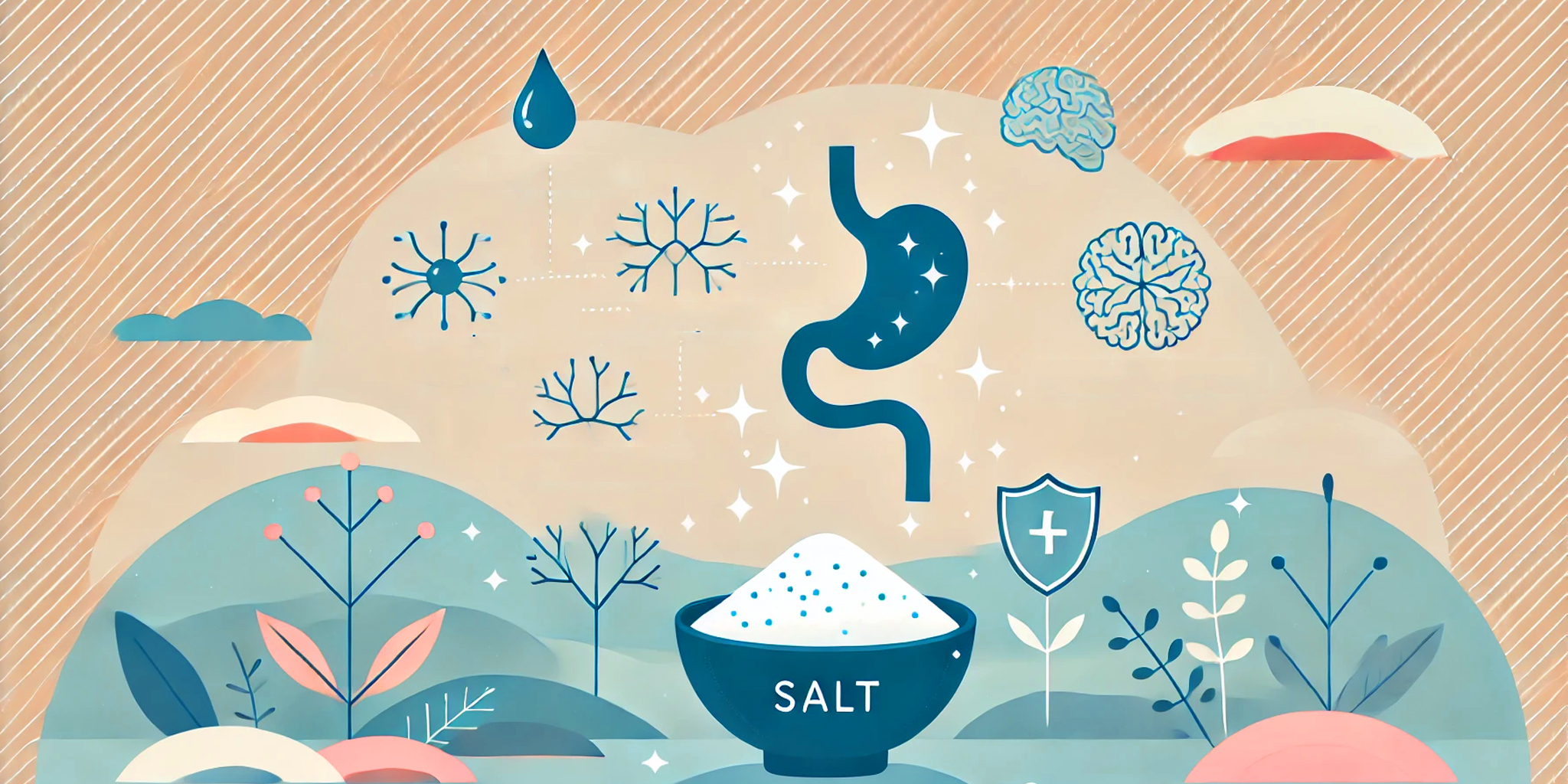Your cart is currently empty!
Salt is very essential for our Good Health! How?
—

Salt can offer several health benefits, particularly for gut and stomach health, when consumed in moderate quantity. Let’s discuss a few reasons, why we should regularly have salt in our diet. Let us also explore the historical significance of salt and how the humans started using salt extensively. Besides that we will also go through the demerits of having too much salt and what is the limit of salt intake for an average human being.
So, without buzzing much, let us delve into it.
Ancient Beginnings
Salt, a substance so common today, has a rich and fascinating history that dates back to ancient times. The story of salt begins over 8,000 years ago when humans first discovered its preserving and flavoring properties. Early evidence suggests that salt was used in prehistoric times to preserve food, a crucial discovery that allowed communities to store surplus food and sustain themselves through harsh seasons.
Archaeologists have discovered ancient salt mines and evaporation ponds that date back to prehistoric times. For example, the Hallstatt salt mine in Austria has been used for over 7,000 years. These sites indicate that early humans were actively harvesting salt.
Some of the earliest records of salt production and use come from ancient China. Texts dating back to around 2700 BCE describe the harvesting of salt from salt lakes and the use of brine to preserve fish and other foods.
In ancient Egypt, around 3000 BCE, salt was a highly valued commodity. The Egyptians used salt in the mummification process, believing it essential for preserving bodies for the afterlife. They harvested salt from the Nile Delta and traded it extensively with neighboring regions. Salt’s ability to preserve meat and fish made it indispensable, leading to the development of trade routes specifically for salt.
The Rise of Salt Roads
As civilizations grew, so did the demand for salt. The ancient Romans built an extensive network of roads called “Via Salaria” or “Salt Roads,” primarily to transport salt from coastal areas to the heart of the empire. Salt was so valuable that Roman soldiers were sometimes paid in salt, giving rise to the word “salary” from the Latin word “salarium.”
Salt and Power
Throughout history, the control of salt resources often translated into power and wealth. During the Middle Ages, cities like Venice and Genoa became powerful maritime republics due to their control over salt trade routes. Salt was also central to the economies of various empires, including the Chinese and Indian empires. In China, the state monopolized salt production and trade, which significantly contributed to its revenue.
The Salt March
One of the most iconic moments in the history of salt occurred in the 20th century during India’s struggle for independence from British rule. In 1930, Mahatma Gandhi led the Salt March, a 240-mile protest against the British monopoly on salt production and the heavy salt tax. This nonviolent act of civil disobedience galvanized the Indian independence movement and highlighted the importance of salt in the fight for freedom.
Modern Times
In contemporary times, salt has become a ubiquitous ingredient, found in virtually every kitchen around the world. Its uses have expanded beyond preservation and seasoning to include de-icing roads, water softening, and various industrial applications. Advances in production methods have made salt abundant and affordable, transforming it from an ancient treasure to a common household item.
How is Salt important for our Good Health?
- Electrolyte Balance: Salt helps maintain the proper balance of electrolytes in the body, which is crucial for maintaining hydration, muscle function, and nerve signaling. This balance is vital for digestive processes.
- Stomach Acid Production: Sodium chloride (table salt) is essential for the production of hydrochloric acid in the stomach. Adequate stomach acid is necessary for breaking down food, absorbing nutrients, and preventing the growth of harmful bacteria.
- Hydration and Nutrient Absorption: Salt aids in the absorption of nutrients in the intestines by promoting the movement of water into the bloodstream. Proper hydration and nutrient absorption are critical for overall digestive health.
- Gut Flora Regulation: Some studies suggest that salt can influence the composition of gut microbiota. While the impact of salt on gut flora is complex and still under investigation, balanced salt intake may support a healthy gut environment.
- Detoxification: Salt can help facilitate the movement of waste through the digestive system, aiding in regular bowel movements and preventing constipation. This detoxification process helps maintain gut health.
- Prevention of Dehydration: Salt helps retain water in the body, preventing dehydration, which can negatively impact gut and digestive health. Dehydration can lead to constipation and other digestive issues.
- Antibacterial Properties: Salt has natural antibacterial properties, which can help prevent infections in the gastrointestinal tract. This is why saline solutions are often used to treat infections or cleanse wounds.
- Supporting Enzyme Function: Salt plays a role in activating certain digestive enzymes, which are necessary for breaking down food and absorbing nutrients efficiently.
While salt has these benefits, it is crucial to consume it in moderation. Excessive salt intake can lead to adverse health effects, such as high blood pressure and increased risk of heart disease. Balancing salt consumption with other healthy dietary practices is key to maximizing its benefits for gut and stomach health.
